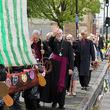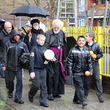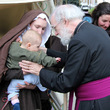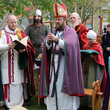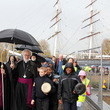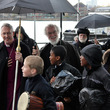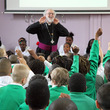Archbishop Commemorates the Martyrdom of St Alfege
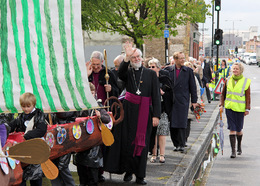 The Archbishop walks with pupils from St Alfege and St Peter’s Primary School
The Archbishop walks with pupils from St Alfege and St Peter’s Primary SchoolFriday 20th April 2012
To commemorate the 1000th anniversary of the martyrdom of St Alfege, the Archbishop of Canterbury, Dr Rowan Williams, joined the Millennium Pilgrimage from Southwark to Greenwich before delivering the Sermon at a service of commemoration in St Alfege Church, Greenwich, the site of St Alfege’s martyrdom.Alfege was the Archbishop of Canterbury from 1005-1012, a time of enormous upheaval, when the struggle between Anglo Saxon Kings and the invaders was at a particularly violent pitch. He was captured in Canterbury, taken prisoner by the Vikings and held for ransom - a ransom which he refused to be paid as he didn’t want to put a burden on the poor people in his own diocese.
The commemorative Millennium Pilgrimage began with a service earlier in the day at Southwark Cathedral, Dr Rowan Williams travelled to Greenwich by river with the Bishop of Southwark on a chartered Thames Clipper. The Archbishop was joined on the boat by pilgrims from churches in South London, as well as representatives from Denmark, Norway and Sweden, including the Archbishop of Upsalla and the Bishops of Bergen and Stavanger.
 During the boat trip, the Archbishop spoke about what a rare opportunity it was to celebrate the 1000th anniversary of an event which we know so much about. “It’s the anniversary of a very dramatic event; a very tragic event…throughout his life, St Alfege had a commitment to using the resources of the Church for the poorest people in his congregations.” He went on to say: “When he was captured by the Vikings, and they asked for a huge ransom, he refused for it to be paid because the burden would fall on the poor. He died not just for his faith, but he died for justice – quite a legacy”.
During the boat trip, the Archbishop spoke about what a rare opportunity it was to celebrate the 1000th anniversary of an event which we know so much about. “It’s the anniversary of a very dramatic event; a very tragic event…throughout his life, St Alfege had a commitment to using the resources of the Church for the poorest people in his congregations.” He went on to say: “When he was captured by the Vikings, and they asked for a huge ransom, he refused for it to be paid because the burden would fall on the poor. He died not just for his faith, but he died for justice – quite a legacy”.
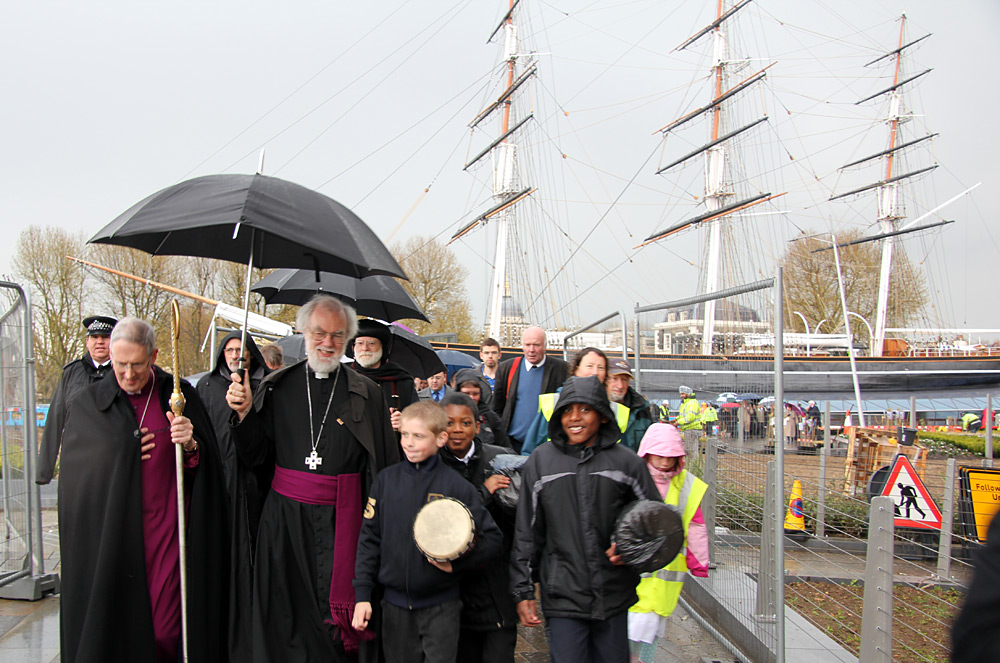 Giving his own reflection on the day, the Dr Williams said “It’s always wonderful to look back on his great predecessors; the real heroes and saints who’ve been in this office”, adding that Alfege offered him particular challenge and inspiration “because of his commitment to the most needy in society and his willingness to put his own life at risk.”
Giving his own reflection on the day, the Dr Williams said “It’s always wonderful to look back on his great predecessors; the real heroes and saints who’ve been in this office”, adding that Alfege offered him particular challenge and inspiration “because of his commitment to the most needy in society and his willingness to put his own life at risk.”
The Archbishop was met at Greenwich Pier by local dignitaries and school children from St Alfege and St Peter’s Primary School. Sheltering under umbrellas, the procession made its way through the Meridian housing estate before arriving in the school hall of St Alfege and St Peter’s Primary School, where schoolchildren performed a song of welcome for the Archbishop.
 At the school, Dr Williams knelt down to be closer to the children, and gave a short talk on reconciliation. He spoke of the enmity between local people and Viking invaders, and he went on to speak about friendships being made in our own time with the descendants of those invaders. He told the children: “Don’t leave it a thousand years before making friends” with enemies, “That’s what St Alfege, patron of this school, would really want you to be doing”. The procession then left the school and filed through Greenwich town centre. The Archbishop walked with pupils, who had made model Viking ships.
At the school, Dr Williams knelt down to be closer to the children, and gave a short talk on reconciliation. He spoke of the enmity between local people and Viking invaders, and he went on to speak about friendships being made in our own time with the descendants of those invaders. He told the children: “Don’t leave it a thousand years before making friends” with enemies, “That’s what St Alfege, patron of this school, would really want you to be doing”. The procession then left the school and filed through Greenwich town centre. The Archbishop walked with pupils, who had made model Viking ships.
Upon arriving at St Alfege Church, the Archbishop was met by actors who had set up an Anglo Saxon model village, which aimed to depict what life in the area may have been like a thousand years ago. Dr Williams addressed the gathered audience of pilgrims from a replica Viking boat, saying:
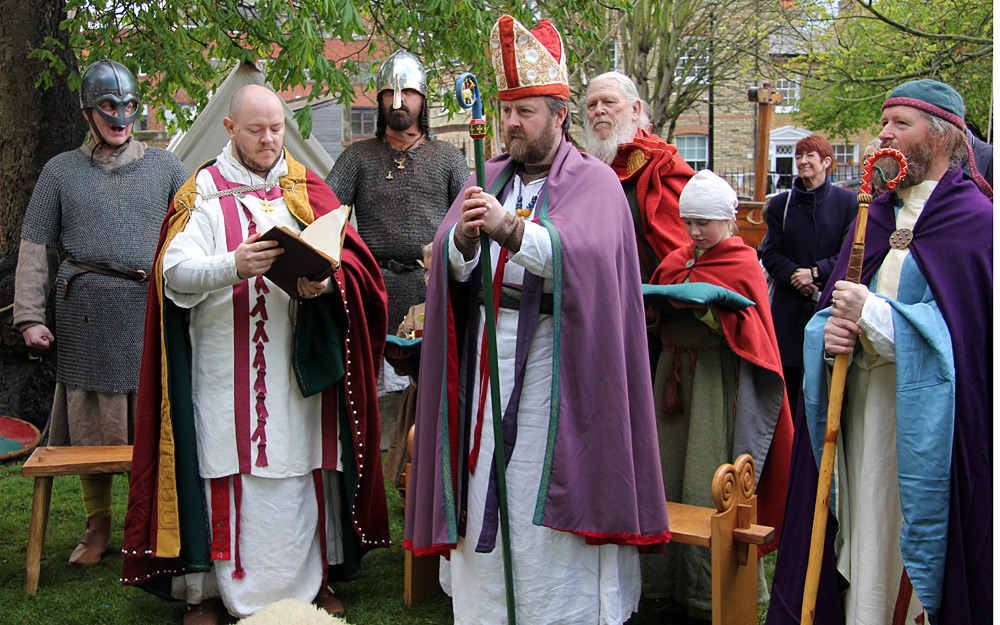
“We’ve come to a place which we all share together as Christians, a place where somebody actually gave their life for what is of most concern to God - that’s what we’re here to celebrate.”
“Thank you for being part of this celebration and for commemorating one of my greatest and most wonderful predecessors”. He concluded by thanking the actor who took the place of Alfege, “rather than myself” in a dramatic re-enactment of the martyr’s stoning, and offered a prayer for the conclusion of the pilgrimage.
The Archbishop’s address and prayer can be heard by clicking here
 The Archbishop then spent time talking to the crowd that had filled the churchyard, and spoke with the ‘villagers’, who demonstrated activities such as coin minting.
The Archbishop then spent time talking to the crowd that had filled the churchyard, and spoke with the ‘villagers’, who demonstrated activities such as coin minting.
The day concluded with a service of commemoration at St Alfege Church, during which the Bishop of Southwark, Rt Revd Christopher Chessun and the Bishop of Bergen, The Rt Revd Halvor Nordhaug signed a Declaration of Intent for a twinning agreement between their two dioceses. The Archbishop delivered the Sermon, which warned of the danger of attempting to place a monetary value on human life.
Dr Williams began the sermon by quoting a line from the Gospel of Matthew (16.24-26): “What will they give in return for their life?”, before going on to say “You can’t put a price on lives. The best thing we can say about the value of our lives is that they are literally beyond value.”
“There is no tariff that tells you exactly how much a human life is worth, let alone a tariff which tells you what different sorts of human life are worth…But St. Alfege still lived in a society where a lot of people thought in terms of such tariffs.”
“St. Alfege refused to be ransomed because he didn’t believe that his own life was worth more than the lives of the peasants of the South East of England who would have had to pay for him to be released.”
“It’s only when you realise that every single human life is literally beyond calculated price that you can begin to approach any and every other human being with God’s own excitement and extravagance of love.”
The full audio of the sermon can be heard by clicking here
A transcript of the Archbishop’s sermon is below:
“What will they give in return for their life?” asks Jesus in the Gospel we just heard. And in the readings today, what we’ve been learning about is the way in which the Bible gradually moves towards just that question. In the Old Testament lesson, we heard God speaking to his people, piling up the price of their life. “I will give nations in return for you; you are so precious to me that I will give the whole resource of a nation to save your lives. I’ll pile on the extravagance with which I am prepared to treat you,” says God to his people. And then when it comes to words of Jesus himself, we have the final point. “What will they give in return for their life?”
You can’t put a price on lives, and the best thing we can say about the value of our lives is that they are literally beyond value. There is no tariff that tells you exactly how much a human life is worth, let alone a tariff which tells you what different sorts of human life are worth.
But St. Alfege still lived in a society where a lot of people thought in terms of such tariffs. In the laws of many parts of Anglo Saxon England and indeed the whole of Europe at the time, you paid different levels of fine, depending on the importance of the person you’d offended. For example, hitting a peasant was something you could probably pay for quite easily if you were reasonably well off, whereas hitting an Archbishop was properly punishable and a much more serious matter. Lives were calculated differently. And the murder of a certain class of person was manifestly a lot less important than the murder of another class of person.
In spite of the surface Christianity of Anglo Saxon England, and the rest of Europe, people still thought in those terms. And so long as you do think in those terms, putting a price on human lives, and putting different prices on different kind of human lives, you never actually get to the point of universal reconciliation. Because it’s only when you realise that every single human life is literally beyond calculated price that you can begin to approach any and every other human being with God’s own excitement and extravagance of love.
We’re celebrating today not only St. Alfege but our existing friendship with those who once were enemies. We’re celebrating reconciliation; celebrating the fact that we’re bound in a deeply fruitful and warm family relationship with the churches of Scandinavia. And as we celebrate our friendly and neighbourly relations with these churches, we are reminded of how important it is, in the whole Christian world, to share exactly that same sense of universal friendship. And that sense of universal friendship comes from that conviction that human lives are beyond price. That there is no way in which we can set out a tariff for lives; every life is as important as every other.
And St. Alfege refused to be ransomed because he didn’t believe that his own life was worth more than the lives of the peasants of the South East of England who would have had to pay for him to be released.
The church of God lives from that sense of the priceless quality of human life. The church of God lives out of that conviction, that there is no way that we can calculate what can be given in return for a life. No way in which we can set out a price list for human beings. And while it might seem obvious to say that, we live in a world where it’s perfectly clear that we in the wealthier parts of the world regard our lives in all kinds of ways as basically a lot more valuable than those of people in other parts of the world. We live increasingly in a society where something unpleasantly like a tariff for the values of human life is creeping back. And the church has got to resist it as bravely as St. Alfege did.
I learned recently that it’s not uncommon in the United States for some wealthy people to buy the life insurance of others who have a shortened life span. They will promise to give them a certain sum of money for the rest of their lives, assuming that that will only be a year or 18 months, and then they will collect a massive sum in insurance. That sounds remarkably like putting a price on human life, and remarkably like an assumption that some lives are intrinsically worth more than others.
It’s been pointed out too, that in those societies where people are paid financial rewards for giving blood, it’s the poor who give it, and the rich who buy it. Are we as far from Alfege’s world as we like to think? It rather sounds as though we’re not. And in that world where these seductive, deeply dangerous tendencies are rippling away around us, it’s important for the church to be brought back to that basic insight which Alfege’s martyrdom sets before us.
“What will they give in return for their life?” Every life is beyond price. Every life demands from us an attention, a love and a delight that cannot be calculated. Every life demands from us what is really impossible, what only God can give, an attention and a love that is truly beyond limit. Because if our value is beyond price, only the God who’s love is beyond limit can truly value us.
Alfege’s successor, Anselm, 100 years after Alfege’s martyrdom, developed a complicated theory about how God saves us through the cross of Christ. A theory which has not always found favour with theologians in the modern era. But at the heart of that theory, strangely, is that same vision. There is something about us as human beings which is beyond price, something which only God’s love can really honour, can really deal with. And when we look at what God does for us and the cross and Jesus Christ, what we discover, above and beyond anything else we might want to say about it, is that it shows us a love beyond limit, rescuing lives beyond price.
And out of that, as I said earlier, out of that comes the true motivation for universal reconciled community. The kind of community in which we don’t imagine that people on the edges or the outside are intrinsically of less value. Where strangers are as incalculably, immeasurably valuable as friends. Where whenever we meet a stranger, we are prompted by the memory of God’s endless love pouring itself out in service to our endless value, including the value of the stranger, and including especially the value of the stranger we don’t very much like.
I wonder if it’s too fanciful to think of Alfrege facing his death thinking back to what had been in his mind and in his mouth a week before. The remembrance of Christ’s passion. He was killed, we’re told, on the Saturday of Easter week. He was still singing his hallelujahs day by day in the office and the mass. He was still meditating day by day on the mystery that had been unfolded seven days earlier, the mystery of the cross and the resurrection, the mystery of endless love from God poured out in the service of the endless value of everyone. And did he then look at his murderers and think with his last few breaths, “The son of God died for them. The life and love of God was poured out without reserve for these human beings without price.”
I like to believe that that was in his mind, and I say that because we do know of Christian martyrs in our own age who have said just that when they’ve faced their deaths. And we know from the New Testament itself of how Christ from the cross, and St. Stephen, the first martyr facing his murderers, alike prayed for them, recognising their endless value.
“What will they give in return for their life?” What we celebrate in the body of Christ, in the memory and witness of the martyrs, the service of all holy people, is that since of life beyond Christ. And we know it is beyond Christ because the love that serves it, that made it and saves it and heals it, is beyond measure. It’s a very uncomfortable place to be for us, standing as it were between those two infinites, those two absolutes, recognising in ourselves and in our neighbours a worth, a value beyond measure. Recognising in the God who made us and loves us a love beyond all limit.
How much easier to go back to a world where we can calculate the value of lives, and especially when we can comfortably calculate the value of lives rather like ours. How much more disorienting to be thrust into this world where endless value and endless love come together in the cross of Christ and in his body, the church. How much more upsetting, but how much more exciting. How much more wonderful, to be able to look at our neighbours with that sense of endlessness, to look at a neighbour with the feeling, there is a life with immeasurable worth, regarded by God with immeasurable love.
Alfege doesn’t just teach us a message about Christian courage in the face of persecution, he doesn’t even just teach us a message about social justice, though as St. Anselm recognised a century later, he had quite a lot to say about that too. He teaches us something about how we as Christian believers are obliged to regard our own human selves and our God, obliged to look into the infinite depth of value that God has placed in each one of us and to look into the infinite depths of his love.
And in our fellowship with Alfege and with all the saints and martyrs, we give thanks for that endlessness, and we take a step forward today in our endless pilgrimage into love, presenting ourselves to be fed by that immeasurable generosity of God, that extravagance of God, poured out in the life and death and resurrection of Jesus. Poured out for us in the cup of salvation that we share in Holy Communion. Poured out through us for justice and for healing in the whole human world. In the name of the Father and Son of the Holy Spirit.
Amen.
© Rowan Williams 2012

